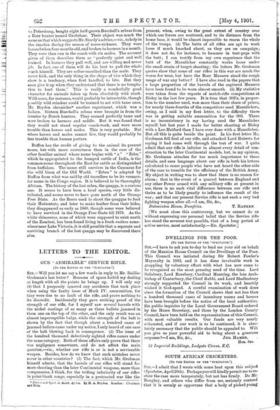LETTERS TO THE EDITOR.
OUR " ADMIRABLE " SERVICE RIFLE.
[TO THE EDITOR OF THE "SPECTATOR."] SIR; Will you let me say a few words in reply to Mr. Baillie- Grohman's last letter ? Reasons of space forbid my dealing at length with all the points he brings up. I will only say (1) that I purposely ignored any accidents that took place when using the faulty issue of Mark IV. ammunition, for they were due to no fault of the rifle, and prove nothing to its discredit. Incidentally they gave striking proof of the strength of our rifle, for I myself saw several barrels with the nickel coatings of as many as three bullets jammed in them one on the top of the other, and the only result was an almost imperceptible bulge, while the strength of the .bolt is shown by the fact that though about a hundred cases of jammed bullets came under my notice, I only heard of one case of the bolt blowing back in consequence. (2) The issue of the hundred thousand defectively sighted rifles comes under the same category. Both of these affairs only prove that there was negligence somewhere, and do not affect the main question,—viz., whether our rifle is or is not a serviceable weapon. Besides, how do we know that such mistakes never occur in other countries ? (3) The fact, which Mr. Grohman himself . admits, that the barrels of our rifles will stand far more shooting than the later Continental weapons, more than compensates, I think, for the trifling inferiority of our rifles in point-blank range, especially in a protracted war like the Natnrt and Sport in South Africa. By H. A. Bryden. Loudon: Chapman and Mil:. present; when, owing to the great extent of country over which our forces are scattered, and to its distance from the home base, it would be almost impossible to rearm the whole of the troops. (4) The butts of all rifles are apt to work loose if much knocked about, as they are on campaign; it does not do, for instance, to hammer in tent-pegs with the butt; I can testify from my own experience that the butt of the Mannlicher constantly works loose under the small strain of target shooting; the letters Mr. Grohman quotes show that some of our rifles in this war are much the worse for wear, but have the Boer Mausers stood the rough usage of war any better? I have also read in the papers that a large proportion of the barrels of the captured Mausers have been found to be worn almost smooth. (5) My statistics were taken from the reports of match-rifle competitions at Bisley in the last few years. It is true that .303's, in propor- tion to the number used, won more than their share of prizes, for nearly three-fourths of the competitors used Mannlichers, owing, as I said in my first letter, to the difficulty there was in getting suitable ammunition for the .303. There is no inconsistency in my having used the Mannlicher myself, but last year I made far better shooting at Bisley with a Lee-Metford than I have ever done with a Mannlicher. But all this is quite beside the point. In his first letter Mr. Grohman fell foul of our rifle, and attacked Lord Roberts for saying it had come well through the test of war. I quite admit that our rifle is inferior in almost every detail of con- struction to the later Continental models, but, in any opinion, Mr. Grohman attaches far too much importance to these details, and uses language about our rifle in both his letters calculated to cause people who have not heard the other side of the case to tremble for the efficiency of the British Army. My object in writing was to show that there is no reason for alarm; that in the event of a quarrel between England and any other Power armed with any military rifle at present in use, there is no such vital difference between our rifle and theirs as to be likely greatly to influence the result of the war; and that our present Service rifle is not such a very bad fighting weapon after all.—I am, Sir, &c., Dalswinton House, Dumfries. T. IttatICEN.
[We must close this controversy, but we cannot- do so without expressing our personal belief that the Service rifle has stood the severest test possible, that of a long period of active service, most satisfactorily.—En. Spectator.]










































 Previous page
Previous page